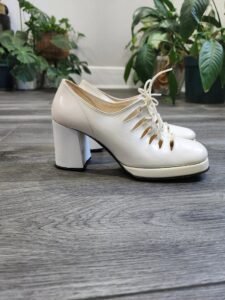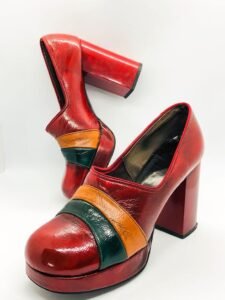1970s Platform Shoes catapulted fashion to new heights, both literally and figuratively, defining an era of bold style statements. Step into the world of fashion history with a journey back to the 1970s, where platform shoes reigned supreme. These iconic footwear pieces not only elevated height but also became a symbol of bold, expressive style during an era defined by its cultural revolution. Join us as we explore the allure and impact of 1970s platform shoes on fashion and pop culture.
Table of Content
- The 1970s Revolution of Platform Shoes
- Fashion Trends Shaped by Platform Shoes
- Iconic Styles and Design of Platform Shoes
- Platform Shoes’ Influence on Pop Culture
- Legacy and Modern Interpretations of Platform Shoes

The 1970s Revolution of Platform Shoes
Fashion Trends Shaped by Platform Shoes
High-Fashion Height
Platform shoes introduced a dramatic increase in height compared to traditional footwear. With thick soles often ranging from a few inches to several inches in height, they provided wearers with a towering stance that instantly commanded attention. This trend towards heightened footwear influenced the design of heels and boots across the fashion industry, leading to a broader acceptance of elevated styles in both casual and formal contexts.
Disco Fever
The disco era embraced platform shoes as essential attire for dancing the night away. Their comfortable yet stylish designs made them ideal for the energetic dance floors of disco clubs. Platform shoes often featured glittering finishes, metallic hues, and bold patterns that perfectly complemented the flashy attire of disco fashion. They became synonymous with the vibrant nightlife scene, symbolizing freedom, fun, and uninhibited self-expression.
Casual Chic
Beyond their association with disco culture, platform shoes became a staple of everyday fashion in the 1970s. They were paired with a variety of casual wear, including bell-bottom jeans, maxi skirts, and wide-legged trousers. The combination of comfort and fashion-forward design made platforms a popular choice for individuals looking to make a statement in their day-to-day attire. Their flexibility allowed them to transition seamlessly from the dance floor to the streets, embodying the relaxed yet stylish vibe of 1970s streetwear.
Gender Fluidity
Platform shoes challenged traditional notions of gender-specific footwear. Unlike previous trends that often dictated distinct styles for men and women, platforms were embraced by individuals of all genders. Both men and women appreciated the bold and assertive look that platform shoes offered, contributing to a more inclusive approach to fashion. This acceptance of gender fluidity in footwear was a significant cultural shift that mirrored broader social changes towards equality and personal freedom.
Experimental Designs
The popularity of platform shoes encouraged designers to push the boundaries of shoe design. They experimented with a wide range of materials, colors, and decorations to create unique and eye-catching styles. Platforms were crafted from luxurious materials such as leather, suede, and velvet, often featuring intricate detailing like studs, straps, and embroidery. Bold colors and psychedelic patterns were also prevalent, reflecting the eclectic and experimental spirit of 1970s fashion.
Iconic Styles and Design of Platform Shoes
Chunky Heels and Soles
One of the defining features of platform shoes was their thick, chunky heels and soles. These elevated platforms often ranged from a few inches to several inches in height, providing wearers with a significant boost in stature. The chunky design not only added height but also contributed to the shoe’s robust and impactful appearance.
Wedge Platforms
Alongside chunky heels, wedge platforms emerged as another popular style. Wedges offered a more gradual incline from heel to toe compared to traditional heels, providing wearers with stability and comfort while still achieving considerable height. Wedge platforms were favored for their sleek and streamlined silhouette, making them versatile for both casual and dressy occasions.
Bold Colors and Materials
Platform shoes were available in a wide array of colors and materials that reflected the eclectic and vibrant spirit of the 1970s. Bright hues such as electric blue, vibrant red, and metallic gold were popular choices, often complemented by glossy finishes or metallic sheens. Materials ranged from patent leather and suede to exotic textures like snakeskin or faux fur, adding texture and visual interest to the shoes.
Decorations and Details
Platforms were often decorated with decorative details that enhanced their visual appeal. Studs, buckles, and straps were commonly used to add a touch of edge and personality to the shoes. Embroidery, sequins, and beads were also popular decorations, particularly on evening and disco-inspired platforms that emphasized glamour and extravagance.
Iconic Silhouettes
Certain silhouettes of platform shoes became iconic representations of 1970s fashion. Platform boots with towering heels and knee-high shafts exuded a bold and rebellious attitude, while platform sandals with open toes and chunky straps offered a more relaxed and summery vibe. Each silhouette captured a different facet of the era’s diverse fashion landscape, from disco glam to bohemian chic.
Platform Shoes’ Influence on Pop Culture
Music and Performers
Platform shoes became iconic in the world of music, particularly within disco and glam rock genres. Artists like Elton John, David Bowie, and ABBA’s Agnetha Fältskog embraced platform shoes as part of their stage personas, using them to enhance their larger-than-life performances. The shoes not only elevated their height but also symbolized extravagance and theatricality, contributing to the visual spectacle of live concerts and music videos.
Film and Television
Platform shoes made frequent appearances in film and television during the 1970s, often as symbols of fashionable rebellion or as markers of specific cultural movements. Characters in films such as “Saturday Night Fever” and “Boogie Nights” wore platform shoes to embody the disco culture of the era, showcasing their role in defining on-screen fashion trends.
Fashion Photography and Magazines
Platform shoes graced the pages of fashion magazines and photography spreads, becoming emblematic of avant-garde and experimental fashion photography. Photographers and stylists used platforms to create visually striking compositions that captured the essence of 1970s style, from high-fashion editorials to streetwear features.
Subcultural Movements
Beyond mainstream media, platform shoes were adopted by various subcultural movements of the 1970s. They became symbols of countercultural expression, worn by individuals who identified with punk, glam, and hippie subcultures. Platform shoes represented defiance against societal norms and a rejection of traditional fashion boundaries, aligning with the rebellious spirit of these movements.
Enduring Legacy
The influence of platform shoes extends beyond the 1970s, continuing to inspire fashion designers, musicians, and artists in contemporary pop culture. Modern interpretations of platform shoes pay homage to their retro roots while adapting to current fashion trends, demonstrating their enduring appeal and cultural significance.

Legacy and Modern Interpretations of Platform Shoes
Fashion Revivals
Periodic revivals of 1970s fashion trends bring platform shoes back into the spotlight, reaffirming their status as timeless icons of style. Designers reinterpret classic silhouettes with contemporary materials and decorations, offering updated versions that blend nostalgia with modern aesthetics.
High-Fashion Adaptations
Platform shoes have transcended their disco origins to become fixtures on high-fashion runways. Design houses incorporate platforms into their collections, experimenting with luxurious materials, intricate detailing, and innovative silhouettes that appeal to fashion-forward consumers seeking statement pieces.
Streetwear and Casual Wear
In streetwear and casual fashion, platform shoes maintain a strong presence. Brands and retailers offer a variety of platform sneakers, sandals, and boots that cater to diverse tastes and preferences. These shoes blend comfort with bold design elements, making them popular choices for everyday wear among style-conscious individuals.
Cultural Icons and Influencers
Celebrities and influencers continue to embrace platform shoes as symbols of personal style and self-expression. Their endorsements through social media and public appearances contribute to the ongoing popularity of platforms. This influenced consumer trends and fostering a renewed interest in retro-inspired footwear.
Sustainability and Innovation
As fashion evolves, there’s a growing emphasis on sustainability and ethical production practices. Some brands are reimagining platform shoes using eco-friendly materials and manufacturing processes, aligning with contemporary values of environmental responsibility while preserving the essence of iconic 1970s design.
FAQ’s on 1970s Platform Shoes
Why were platform shoes popular in the 1970s?
Platform shoes were popular for their ability to add height and make a bold fashion statement during a time of cultural revolution and self-expression.
What materials were used to make platform shoes in the 1970s?
Platform shoes were crafted from a variety of materials including leather, suede, patent leather, and sometimes exotic materials like snakeskin or metallic finishes.
Who wore platform shoes in the 1970s?
They often update modern twists while retaining their iconic silhouette and cultural appeal.
Are platform shoes still fashionable today?
Yes, platform shoes continue to be fashionable today with periodic revivals in fashion trends. Modern twists often update them while retaining their iconic silhouette and cultural appeal.
What are some tips for wearing platform shoes?
When wearing platform shoes, consider balancing the height with proportionate clothing. Pair them with wide-leg trousers or maxi skirts for a retro-inspired look, or with casual outfits for a contemporary twist.
